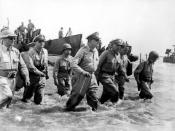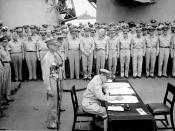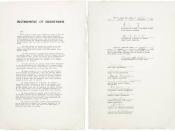Before the final stages of World War 2 (WW2) the Japanese had faith in a system of government and structure of society that appeared to work well. The voices of opposition to Japan's militaristic ambitions were quashed with little complaint, theirs being the minority view, considered unpatriotic at best, treasonable at worst. The people trusted that their leaders and their Emperor had their best interests at heart, even as they were being bombed and their sons were falling in battle. The realization, as the war came to its cataclysmic end, that their leaders had lied to them and failed them, was compounded by the devastation that the US bombings wreaked upon their cities and their society. The Japanese, having been let down so badly, sought to rebuild a new society in the ruins of the old. It was in this new society that the idea of unarmed neutrality took hold in the ruins of failed militaristic ambition.
The second question asks us to consider how far the Yoshida administration's foreign policy followed the ideas of unarmed neutrality. Here, I will consider the various impacts on Yoshida's foreign policy and the constraints placed on Yoshida and his government by the occupation forces and the international political situation. In addition to the domestic upheavals and urgent need to re-build Japanese self-confidence, Prime Minister Yoshida had to contend with the changing attitudes of the US occupation forces amid the increasing animus of the cold war and an international community that both feared and reviled his country for its conduct up to and during WW2, conduct that had led the world to view the Japanese as barbarians who must never be allowed to rearm and threaten their neighbours again.
It was the post-war work of the Peace Issues Discussion Group, or Danwakai (a group...


